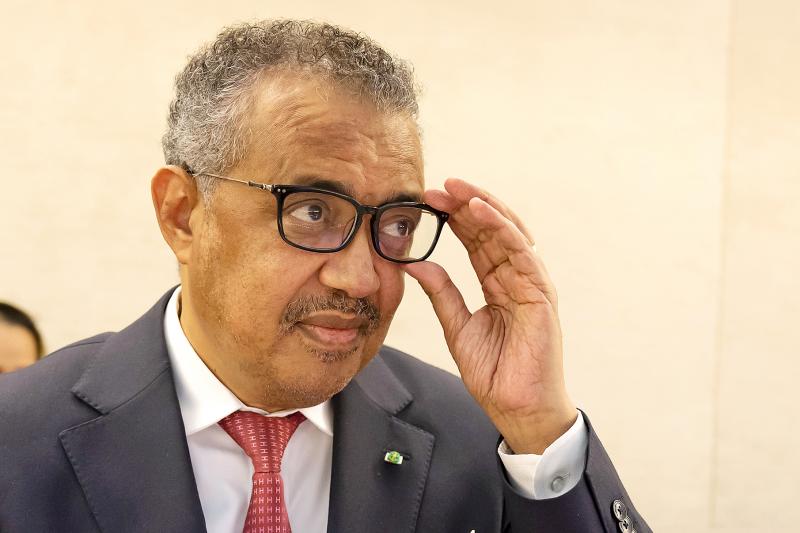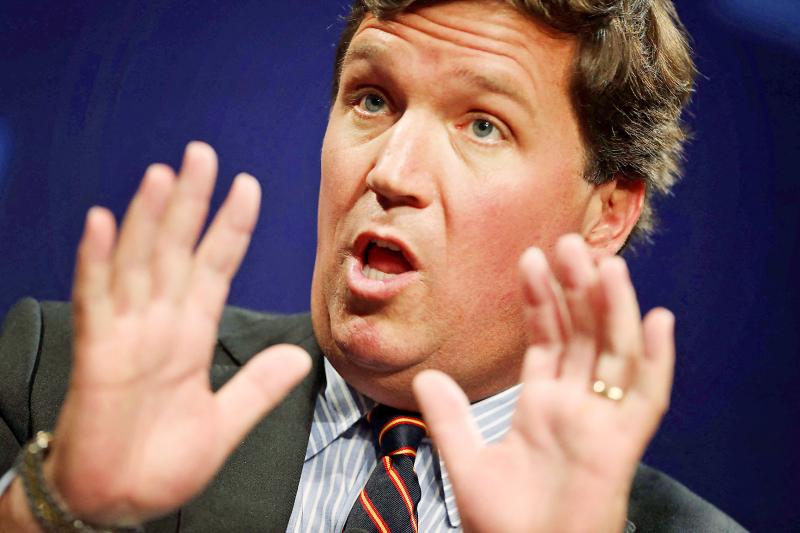The WHO is battling critics of its COVID-19 response who say it is scheming to take over health policy in sovereign nations as it pushes plans it says would help avert future pandemics.
High-profile attempts in countries around the world to discredit the WHO’s efforts are casting a shadow over talks in Geneva, Switzerland, this week.
Country representatives at the talks are discussing how to pave the way for a global agreement that could eventually regulate how nations prepare for and respond to future pandemic threats.

Photo: EPA-EFE
“We may face more severe pandemics in the future and we need to be a hell of a lot better prepared than we are now,” WHO Health Emergencies Program executive director Michael Ryan told reporters recently. “That’s going to require countries to work together.”
It is still far from clear what any future agreement would contain and whether countries would decide that they want it to be a treaty or some other “legal instrument.”
The negotiations — involving member states, not the WHO — are set to last at least two years.

Photo: AFP
However, critics have said that the UN health body is out for a power grab.
Fox News anchor Tucker Carlson, in a segment last month on the pandemic treaty, said that US President Joe Biden’s administration was close to “handing the World Health Organization power over every aspect, the intimate aspects of your life.”
Christine Anderson, a German member of the European Parliament, has warned that the agreement would grant “the WHO de facto governing power over member states.”
British comedian and YouTuber Russell Brand — who challenged the WHO over its attitude toward Taiwan — told his audience that the future treaty meant “your democracy is ... finished.”
“The solution to our ... [pandemic] problems is not to grant more power to an organization that is primarily funded by the United States of America, then Bill Gates’ foundation then the United Kingdom,” he said in a video released on May 21. “I think that they might be subject to biases that are at odds with ... our health requirements.”
The WHO and experts say that such theories, which have also been mentioned in Germany, Australia, Russia and other countries, have nothing to do with what is being discussed.
“I am frankly baffled by the degree of disinformation,” Suerie Moon, codirector of the Global Health Centre at the Geneva Graduate Institute, told reporters, adding that the agreement “is really in the embryonic stage.”
Many of the claims are “completely disconnected from the reality of what is being proposed and potentially negotiated,” Moon said.
WHO Director-General Tedros Adhanom Ghebreyesus also recently said that “unfortunately, there has been a small minority of groups making misleading statements and purposefully distorting facts.”
The “WHO’s agenda is public, open and transparent,” Tedros said.
The pandemic agreement is solely about establishing “the playbook for how we’re going to prepare together” for future pandemic threats, Ryan said.
“That’s not about sovereignty; that’s about responsibility,” he said.
However, proponents of the plans are struggling to make such arguments heard.
The WHO coined the term “infodemic,” saying that there was a deluge of disinformation surrounding its efforts to rein in the COVID-19 pandemic, especially regarding vaccines.
And now observers suggest that the WHO and the planned agreement it is pushing for have become targets of a disinformation campaign across multiple countries, although the exact goal and who is behind it remain unclear.
Just the name WHO “is like a trigger,” Tristan Mendes France, a French conspiracy theory expert, told reporters, adding that it was easy to “reactivate” the “huge conspiracy theory audience that has been growing during COVID.”
Sebastian Dieguez, a neuroscientist and disinformation expert at Switzerland’s University of Fribourg, pointed to how social media groups dedicated to one form of extremist thought or conspiracy theory often switch names and topics, bringing hundreds of thousands of followers along.
“When you have a solid network on something, it can be used for other things,” he said.
“Even though some of it is absurd, you still have to deal with it, you still have to explain, and this cuts out resources,” Dieguez said.
Moon said that there “are limits to what WHO can do,” pointing to rampant misinformation — when faulty information is shared due to honest misunderstandings — and mistrust in authorities across the board in “this post-truth era, where people live in different information universes.”
“Can WHO change that? Can anybody?” she asked.
Additional reporting by staff writer

South Korea would soon no longer be one of the few countries where Google Maps does not work properly, after its security-conscious government reversed a two-decade stance to approve the export of high-precision map data to overseas servers. The approval was made “on the condition that strict security requirements are met,” the South Korean Ministry of Land, Infrastructure and Transport said. Those conditions include blurring military and other sensitive security-related facilities, as well as restricting longitude and latitude coordinates for South Korean territory on products such as Google Maps and Google Earth, it said. The decision is expected to hurt Naver and Kakao

THE TRAGEDY OF PUNCH: Footage of the seven-month-old Japanese macaque has gone viral online after he was rejected by his mother and formed a bond with a soft toy A baby monkey in Japan has captured hearts around the world after videos of him being bullied by other monkeys and rejected by his mother went viral last week. Punch, a Japanese macaque, was born in July last year at Ichikawa City Zoo. He has drawn international attention after zookeepers gave him a stuffed orangutan toy after he was abandoned by his mother. Without maternal guidance to help him integrate, Punch has turned to the toy for comfort. He has been filmed multiple times being dragged and chased by older Japanese macaques inside the enclosure. Early clips showed him wandering alone with

MONEY GRAB: People were rushing to collect bills scattered on the ground after the plane transporting money crashed, which an official said hindered rescue efforts A cargo plane carrying money on Friday crashed near Bolivia’s capital, damaging about a dozen vehicles on highway, scattering bills on the ground and leaving at least 15 people dead and others injured, an official said. Bolivian Minister of Defense Marcelo Salinas said the Hercules C-130 plane was transporting newly printed Bolivian currency when it “landed and veered off the runway” at an airport in El Alto, a city adjacent to La Paz, before ending up in a nearby field. Firefighters managed to put out the flames that engulfed the aircraft. Fire chief Pavel Tovar said at least 15 people died, but

Australian Prime Minister Anthony Albanese yesterday said he did not take his security for granted, after he was evacuated from his residence for several hours following a bomb threat sent to a Chinese dance group. Albanese was evacuated from his Canberra residence late on Tuesday following the threat, and returned a few hours later after nothing suspicious was found. The bomb scare was among several e-mails threatening Albanese sent to a representative of Shen Yun, a classical Chinese dance troupe banned in China that is due to perform in Australia this month, a spokesperson for the group said in a statement. The e-mail